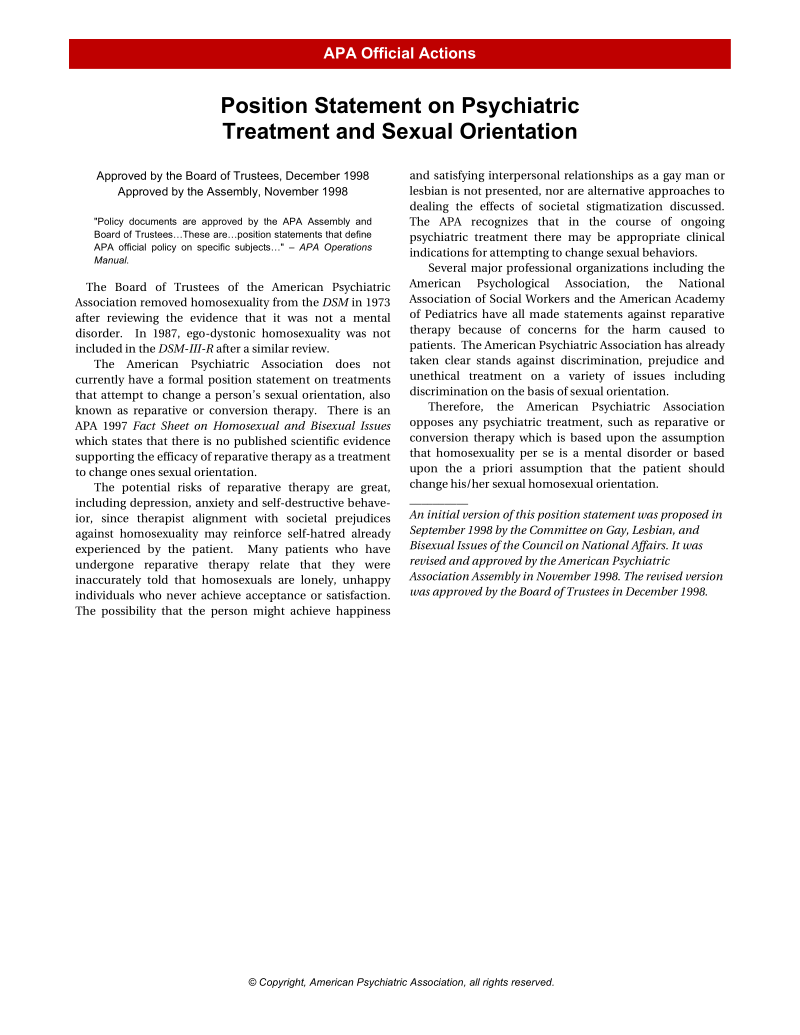American Psychiatric Association 1998 statement condemning "reparitive" therapy if it is based on premise that homosexuality is a mental illness.
- Type
- Academic / Technical Report
- Source
- American Psychiatric Association Non-LDS
- Hearsay
- Direct
- Reference
American Psychiatric Association, "Position Statement on Psychiatric Treatment and Sexual Orientation," May 1998, included in APA Official Actions, May 2000
- Scribe/Publisher
- American Psychiatric Association
- People
- American Psychiatric Association
- Audience
- American Psychiatric Association
- Transcription
Position Statement on Psychiatric Treatment and Sexual Orientation
Approved by the Board of Trustees, December 1998 Approved by the Assembly, November 1998
"Policy documents are approved by the APA Assembly and Board of Trustees...These are...position statements that define APA official policy on specific subjects..." – APA Operations Manual.
The Board of Trustees of the American Psychiatric Association removed homosexuality from the DSM in 1973 after reviewing the evidence that it was not a mental disorder. In 1987, ego-dystonic homosexuality was not included in the DSM-III-R after a similar review.
The American Psychiatric Association does not currently have a formal position statement on treatments that attempt to change a person’s sexual orientation, also known as reparative or conversion therapy. There is an APA 1997 Fact Sheet on Homosexual and Bisexual Issues which states that there is no published scientific evidence supporting the efficacy of reparative therapy as a treatment to change ones sexual orientation.
The potential risks of reparative therapy are great, including depression, anxiety and self-destructive behave- ior, since therapist alignment with societal prejudices against homosexuality may reinforce self-hatred already experienced by the patient. Many patients who have undergone reparative therapy relate that they were inaccurately told that homosexuals are lonely, unhappy individuals who never achieve acceptance or satisfaction. The possibility that the person might achieve happiness and satisfying interpersonal relationships as a gay man or lesbian is not presented, nor are alternative approaches to dealing the effects of societal stigmatization discussed. The APA recognizes that in the course of ongoing psychiatric treatment there may be appropriate clinical indications for attempting to change sexual behaviors.
Several major professional organizations including the American Psychological Association, the National Association of Social Workers and the American Academy of Pediatrics have all made statements against reparative therapy because of concerns for the harm caused to patients. The American Psychiatric Association has already taken clear stands against discrimination, prejudice and unethical treatment on a variety of issues including discrimination on the basis of sexual orientation.
Therefore, the American Psychiatric Association opposes any psychiatric treatment, such as reparative or conversion therapy which is based upon the assumption that homosexuality per se is a mental disorder or based upon the a priori assumption that the patient should change his/her sexual homosexual orientation.
__________
An initial version of this position statement was proposed in September 1998 by the Committee on Gay, Lesbian, and Bisexual Issues of the Council on National Affairs. It was revised and approved by the American Psychiatric Association Assembly in November 1998. The revised version was approved by the Board of Trustees in December 1998.
- Citations in Mormonr Qnas
The B. H. Roberts Foundation is not owned by, operated by, or affiliated with the Church of Jesus Christ of Latter-day Saints.

